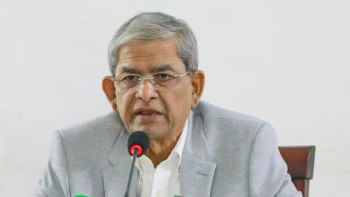Ensure same pension scheme for all

A pension scheme in which the employee and employer make equal contributions is welcome in this economy, but it has to apply to all, be they public university teachers, bureaucrats or other government employees, economists say.
But imposing this scheme on certain types of entities is discriminatory, they add.
Faculty and staff at 35 public universities have been on strike since Monday, protesting a pension scheme which will require those joining on or after July 1 to make contributions to the pension funds.
Experts say public university teachers and government officials should all be under the same pension scheme.
Besides, all teachers should have better packages during their service as well as in retirement, so that the best minds are attracted to the profession, they say.
The finance ministry in a gazette in March announced a pension scheme titled Prottoy for recruits joining the autonomous, self-governing, nationalised, statutory, or such organisations, including public universities, on or after July 1.
Under the scheme, 10 percent of the monthly basic salary of an employee, up to Tk 5,000, will be deducted and given to their pension fund. The employing organisation will contribute the same amount to the fund. The government will pay the authorities managing the pension. There will be no one-time gratuity for the retiring employee.
The government will investment the money, and the proceeds will be added to the fund.
Under the existing pension system, employees do not need to contribute to their pension funds. Faculty and staff recruited before July 1 this year will be under the current pension scheme.
Finance Minister Abul Hassan Mahmood Ali announced in his budget speech on June 6 that government officials, including bureaucrats, would be under a new pension scheme, which the finance ministry later said would be named Shebok. Employees joining after July 1 next year would be under this scheme.
The government has yet to publish terms of Shebok.
University teachers, meanwhile, are concerned that their retirement benefits will be cut by Prottoy while government officials under Shebok will be better off, said Prof Muhammad Shahadat Hossain Siddiquee who teaches economics at Dhaka University.
He is also a member of a committee the protesting teachers formed to review the new pension scheme.
TEACHERS' DEMAND IS LOGICAL
It is good that the government is heading towards a system in which the employee contributes to the pension funds, said AB Mirza Azizul Islam, former adviser to a caretaker government.
The government must manage the fund carefully and meticulously so that it does not turn into a losing concern.
Retired employees should not be kept waiting for the monthly pension.
The government spending in pension and gratuities was Tk 4,395 crore in fiscal year 2009-10 -- 4.3 percent of the budget. For the 2024-25 fiscal year, the government allocated Tk 36,902 crore, which is 4.63 percent of the total budget, according to the Ministry of Finance.
Azizul, also a former chairman of Bangladesh Securities and Exchange Commission, said, "The teachers' demands seem logical."
There should be no discrimination and division in the pension of public servants, added Azizul, also a former Dhaka University teacher.
Prof Shahadat said under the new scheme, new teachers and staffers of public universities would enjoy fewer benefits than they would have under the current one.
The brightest students may not choose to be teachers, he said.
The officials who will now be separated under the Prottoy and Shebok categories were all under the same pension scheme for years, he said.
"So, why is this separation all of a sudden?" he asked, adding that teachers were being downgraded from other government officials.
He said he realised that the government's spending capacity had diminished.
"But the government separated us from other officials."
All government officials should be brought under the same scheme, he said.
A finance ministry official, who wished to remain anonymous, said schemes like Prottoy were common across the world.
A similar scheme was introduced in India in 2004, with 10 percent of basic salaries being deducted and transferred to the pension authority, he said.
The government will not be able to continue bearing the growing pension costs, the official added.
The National Pension Authority said in a press release on Tuesday that out of 403 autonomous, self-governing, nationalised, statutory, or such organisations, 90 are currently under one pension scheme. The rest are under the contributory provident fund (CPF) system with employees getting a one-time fund after their retirement. The new schemes will be effective to ensure pensions for all.
Although under the Prottoy scheme pensions will be provided after employees reach the retirement age of 60, the retirement age of university teachers is 65. The National Pension Authority press release said the government will make corrections in the rules.
The new scheme will not provide any one-time pay after retirement, but the monthly allowance will be multiple times higher than that of the existing system.


 For all latest news, follow The Daily Star's Google News channel.
For all latest news, follow The Daily Star's Google News channel. 









Comments